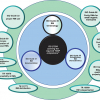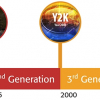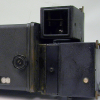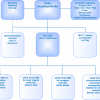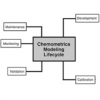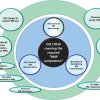Peter J. Jenks
the Jenks Partnership, Newhaven House, Junction Road, Alderbury, Salisbury, Wiltshire SP5 3AZ, UK
This may be the first time that Spectroscopy Europe has reported on political upheavals in the UK, but fall out from the departure of Mr Blair and the arrival of Mr Brown has led to reorganisations in Government departments, particularly those that look after research and innovation, including reference materials (RMs)!
The Department of Trade and Industry (DTI) has lost its responsibility for the Research Councils and science policy, and has become the new Department for Business, Enterprise and Regulatory Reform (DBERR). The Department for Education and Skills (DfES) is now the new Department of Children, Schools and Families (DCSF), and no longer looks after higher education in England. A new Department for Innovation, Universities and Skills (DIUS) will, to quote the new website, “bring together the nation’s strengths in science, research, universities and colleges to build a dynamic, knowledge-based economy”.
Although the websites have not caught up, the NMS and in particular the VAM Programme are now in the new DIUS: this can only be a great development for science and chemical metrology in particular. The DIUS Secretary of State is John Denham, who graduated from Southampton University with a Degree in Chemistry. It is very welcome to have a chemist heading a Government department responsible for science and ultimately, analytical chemistry! It is hoped that under John Denham’s leadership the new DIUS (which includes in its scope Business and Science, The Research Base, The Research Councils, Innovation, National Weights and Measures Laboratory, The National Endowment for Science, Technology and the Arts, liaising with the Department for Culture, Media and Sport, and Commission for Environmental Markets and Economic Performance) will help to bring all aspects of metrology across business, science and research together in a much more logical way than in the past.
For many years the DTI had been responsible for developing, through National Measurement System (NMS) funding, programmes for the development and production of RMs. The NMS is responsible for stimulating good measurement practice and as a result enables business to make accurate and traceable measurements, for the benefit of the nation. But for the NMS, 2007 has been one of upheaval, culminating with the re-shaping and re-focusing of its parent department. The changes started when the NMS projects funded by the former DTI were rearranged into a new set of programmes, a result of the Review of the NMS which took place between 2005 and 2006. The portfolio of NMS programmes was simplified into fewer, larger, programmes that grouped together projects with similar objectives, characteristics, timescales and impacts. This enables more informed strategic choices to be made on the balance of investments between programmes and should be more efficient!
The new Programme areas are: Acoustic, Biotechnology, Electrical, Engineering, Flow International, Ionising Radiation, Knowledge Transfer, Legal, Materials, Measurement for Emerging Technologies, Optical Radiation, Photonics, Quantum, Software, Thermal, Time, Frequency & the Metre, VAM–Chemical, and VAM–Physical.
Within VAM Programmes RM development and production can be found. The NMS invests approximately £60 m a year, but, divided up between all these programmes spending on reference materials is really very small indeed and VAM—Chemical has much to do in addition to producing some reference materials.
The aim of the VAM-C programme is to “Improve the quality and comparability of chemical analytical measurements made in the UK in order to improve our competitiveness and support regulatory need”.
There follows a series objectives that are broad in scope and will be challenging to achieve.
- Providing UK analytical laboratories with a “total analytical package” which should “Help them achieve valid, globally acceptable results”. Key to this is the provision of reference values and tools to help analysts implement the well established “six VAM principles” for good measurement practice.
- Anchoring the UK measurement system to the emerging global system, through participation in the key international inter-comparisons organised by the CCQM.
- Developing and maintaining a high accuracy analytical capability to provide values for reference materials of importance to the UK, which are recognised globally.
- Evaluating new technology, addressing the associated measurement issues and providing the tools to enable analysts to use these with confidence.
The VAM-C programme is designed to help the UK professional analyst capitalise on developments in analytical technology and traceable measurement techniques, helping businesses compete effectively in a global market that demands universally assured products and services.


